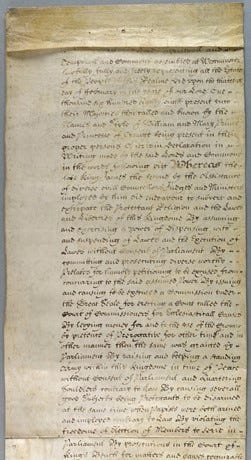The truth in liberalism
Part VI of our canter through Roger Scruton’s “How to be a Conservative”
Jacinda Ardern is “unabashedly liberal” and leads a Labour Party that believes in an expansive role for the state so it can “ensure a just distribution of wealth.” David Seymour is an advocate for liberalism and leads an ACT Party that believes in “reducing the role of government.” Who’s the real liberal? As is often the case, it depends on what you mean by “liberal.” Like many political terms, its meaning has shifted over time and these examples reflect that evolution. Seymour’s is the traditional usage (often denoted “classical liberalism”) and Ardern’s the modern usage (which the Prime Minister herself describes as progressivism). The two lead in opposite directions but share a common history. So which one can lay claim to the truth in liberalism?
Dedicated readers will remember that we’re working through Roger Scruton’s How to be a Conservative, which describes conservative thought partly by considering the merits and the truths of other political philosophies. In chapter six, Scruton considers the truth in liberalism, giving it the traditional meaning favoured by ACT and repudiating the modern usage associated with left-wing politics.
The truth in liberalism, says Scruton, is that “the freedom of the individual [is] one of the purposes, maybe the prime purpose, of government”. This creates a “consensual” society, where we are free to make our own decisions and where “each of us settles his path through life by negotiation, playing his cards according to his own best judgment and without coercion from others.” Scruton goes on:
“Traditional liberalism is the view that such a society is possible only if the individual members have sovereignty over their own lives—which means being free both to grant and to withhold consent respecting whatever relations [with others] may be proposed to them. Individual sovereignty exists only where the state guarantees rights, such as the right to life, limb and property, so protecting citizens from invasion and coercion by others, including invasion and coercion by the state.”
Scruton draws a sharp distinction between this sort of society and “religious forms of social order” where “laws are based on divine prescriptions, and earthly offices are held by delegation from the Deity.” In such a totalising society, he points out, compromise becomes virtually impossible, jeopardising the political process by making it a winner-takes-all proposition. Scruton has two particular concerns in mind—modern Islamism, especially as it rubs shoulders with Western democracies, and historical Christianity, as evidenced by the English Civil War. That war, he says, was due to “the Puritan desire to impose godly rule on the people of Great Britain regardless of whether they wanted it, and the leaning of the Stuart kings towards a Roman Catholic faith that had become deeply antipathetic to the majority …”. The solution was to re-found “the politics of compromise” and to protect subjects from the will of the State in the form of the Bill of Rights 1688 (which is still a part of modern New Zealand law).
But this emphasis on rights contains the seeds of liberalism’s distortion, tracking its evolution from shield to sword. The shift begins with the view that it is not enough simply to have a classical liberal’s freedom or “negative” right, that is, a protected zone of free choice. Instead, modern liberals have argued that we need the ability to realise the right, that is, we need a “positive” right that includes the resources and ability to bring it into being. There’s no point in a right to housing unless we can have a house, for example. But there’s only one social institution big enough to bear the duties called into existence by these “claim rights,” as Scruton calls them—the state itself. Ultimately, the fulfilment of these duties and the achievement of these rights requires a more powerful and expanded state, and “a surrender to the state of all kinds of responsibilities that previously vested in individuals, and the centralization of social life in the government machine.” Rather than protecting a liberal ideal of personal freedom, modern rights regimes have become a threat to it.
Scruton makes a compelling case against modern liberalism and for classical liberalism, but says little about one of the major critiques of the latter tradition. If the individual is sovereign, and the state exists to protect personal freedom, what should that sovereignty and freedom be used for? Unless anything goes, there must be some set of moral guidelines that provide the answer, but liberalism itself gives little guidance. Instead, it merely advances various versions of the harm principle: you’re free to do whatever you like as long as you don’t harm others. But it’s virtually impossible to define “harm” in any principled way without resorting to morality, and there’s the more fundamental difficulty that we are not hermetically sealed off from each other—we are interdependent beings, and our actions almost always have consequences for our neighbours. This is why more recent thinkers have argued that liberalism is dependent on a moral vision that it can’t itself provide, and that as those moral resources run out in an increasingly individualistic society, liberalism itself approaches the point of exhaustion and collapse. Others argue that liberalism is little more than a fig leaf, providing a veneer of procedural neutrality over the reality of a progressive moral vision.
I believe it’s possible to have a high view of freedom without embracing liberalism by recognising that agency—the ability to make meaningful choices—is a fundamental feature of a well-lived life. That means we should be wary of the possibility of coercion by the government or any other institution with power to shape our choices, but it also means the good life is not found solely in maximal freedom to choose. Instead, it means that the government’s role should be limited to what’s necessary to protect the common good, and that we have to do the difficult but rewarding work of arguing for the importance of personal freedom, and for the existence of norms that inform how we should use our choices. And yet modern progressives are often all too ready to impose their moral vision, while classical liberals seem to believe that “freedom” is the beginning and end of every debate. So while this commitment to persuasion and engagement is precisely what’s missed by many liberals, it’s the most important contribution that liberalism has to make in our era.



